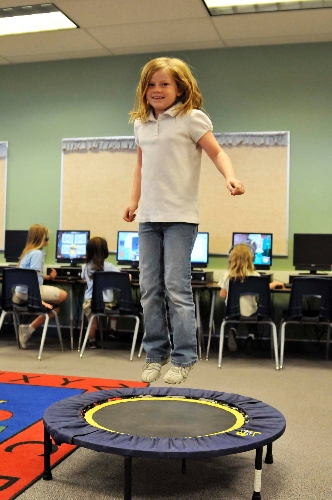Sewell Elementary pulls ahead of pack in promoting a healthy lifestyle for students
It was not unusual to see teachers and students walking laps along the edges of Sewell Elementary School's field before, during and after class this past school year.
Teachers and administrators competed to walk the most miles -- 5½ times around is a mile -- for prizes such as gift cards for massages. Students often joined their teachers on the walks.
The friendly competition was one of Sewell's healthy initiatives to curb childhood obesity that earned the school national recognition from the alliance for a Healthier Generation.
The Alliance supports more than 11,000 schools across the country and encourages them to increase physical activity and offer healthier foods for its students. The program was founded in 2005 by the American Heart Association and the William J. Clinton Foundation.
About 120 Clark County School District schools have applied to the alliance, and Sewell is the first in the state to receive the Bronze Level Award. There also are silver, gold and platinum awards.
Schools receive the awards for meeting a certain number of criteria on checklists in different policy areas, such as school meal programs, competitive foods and beverages, health education, physical activity, physical education and school employee wellness.
At the end of the 2009-10 school year, officials at Sewell, 700 E. Lake Mead Parkway, received a one-time grant of $2,500 from the alliance to fund some of the school's new initiatives. Not every school that applies will receive the grant.
Physical education teacher Geno McCue, principal Carrie Buck and other officials created a wellness panel and devised a plan to help the school meet the bronze criteria.
Teachers were encouraged to allow their students to take some laps whenever there was time, such as during restroom breaks.
In addition to the playground walking initiative, Sewell added a small trampoline to its computer, or "brain lab." After spending a certain amount of time on the computer, or upon reaching a certain score in literacy games, students were allowed to take 10 jumps on the trampoline. That was a big hit among students.
University of Nevada, Las Vegas dieticians also visited the school on three occasions to meet with students and parents and educate them about healthy eating.
McCue said the next big step is getting parents involved in making healthier choices through buying healthy foods and portion control. The school also made a conscious effort to take field trips with an outdoor focus, such as Valley of Fire and Mount Charleston.
"We don't go to Ethel M's Chocolates," Buck said.
The school also made an inventory of every item in its student "snack shack" to make sure they met the alliance's approved list of healthy snacks.
"Some are simple changes, like switching out Gatorades for water," Buck said, "just simple little changes that are no cost to the school."
Sewell also received a grant from the Fresh Fruit and Vegetable Program. Every student gets a fruit or vegetable snack every day during P.E.
"You'd be surprised how many kids love cucumbers now," McCue said.
The school's staff also volunteered time to build a garden from donated materials on the north end of its campus, complete with tomatoes, strawberries, eggplant and artichokes, which eventually will be used as snacks for the kids.
Ben Schmauss is the alliance's relationship manager for Nevada and works with each school to help them achieve their goals through guidance and by providing resources.
Schmauss said every school's plan is different and that the program allows leeway so schools can specially tailor their plans.
"The idea is to create the healthiest school possible," Schmauss said. "We don't come in and say, 'This is what you have to do.' If it's good for kids and staff, it can be part of the program. They can do things their own way."
McCue plans to survey the staff and students next year to find out what they liked and disliked about the program. That input will be used to create a plan to move up to the silver level award in the coming years.
School officials don't have any control over the lunch program -- the district's food service branch makes the menu.
McCue said it was important initially to give incentives for students to want to engage in healthy activities but that he hopes they will come to do these things without needing the treat anymore.
"Sometimes you have to dangle the carrot in front of them," he said. "Hopefully, that will just be a carryover now. My goal is to not have to give out stuff, to get to where they want to do it."
Contact View education reporter Jeff Mosier at jmosier@viewnews.com or 224-5524.




























